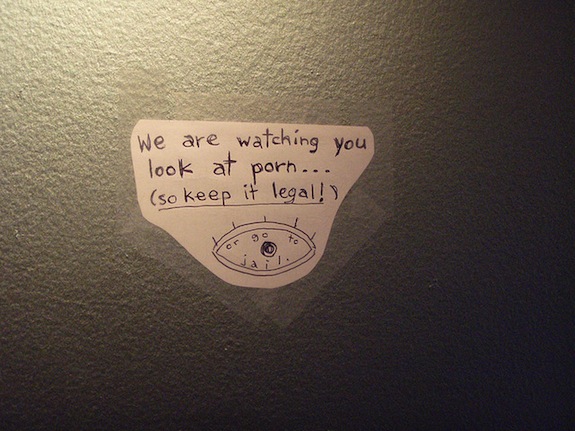The Internet Is Still for Porn—And Parents Are Trying to Figure Out How to Handle That
Welcome to the internet, there will be porn, are you ready for it?

Image: Pink Moose
On Monday, Yahoo CEO Marissa Mayer said she wasn’t going to worry about ridding Tumblr of porn. “It’s just the nature of user-generated content,” she said.
In other words: Welcome to the Internet, there will be porn.
And Mayer is right. The numbers about just how much of the Internet is dedicated to porn are wildly variable, but they’re there. Some estimates put porn at 30 percent of all Internet traffic. Other places claim the percentage is far higher. Forbes put the question to neuroscientist Ogi Ogas, who studies our consumption of all things wicked, and heard that, in 2010, about 4 percent of websites were dedicated to porn and, between July 2009 to July 2010, about 13 percent of web searches were for some sort of erotica.
Now, some of that comes from the changing demographics of who uses the Internet, says Ogas. When the web was first formed, it was largely populated by dudes. “I think in 1999 that 4 or 5 of the top 10 searches on the Web were for porn,” he told Forbes. But now the uses and users of the Internet have increased dramatically. And while Internet users are still looking for porn, it’s not the only thing or even the most common thing they’re after.
But it is there. It’s there, and it’s easy to find. Which is why parents and lawmakers are still talking about it. In the UK, David Cameron announced that all porn sites would be blocked from public places, striving to create “good, clean WiFi.” Mirror News writes that the Prime Minister “stressed the importance of parents having confidence in public internet systems and that their children ‘are not going to see things they shouldn’t’.” And the UK isn’t the only place to talk about cracking down on porn. In Iceland, they’ve proposed to ban all online pornography—a curious turn for a generally liberal country.
Now, actually carrying these bans out is hard. You can’t just flip a switch and change the content of the Internet. The Economist explains why Iceland’s ban in particular would be hard, but the reasons stand for most porn bans:
Banning online pornography would be tricky. The definition of violent or degrading pornography would have to be clearly enshrined in law. Iceland would then have to police the internet, a difficult thing to do. When Denmark and Australia introduced online blacklists in an effort to block porn sites, some innocuous websites crept on to the lists by mistake.
Basically, actually rooting out which sites are porn and which aren’t isn’t as easy as it might sound. And, ban or no ban, porn will always be on the Internet for those who choose to seek it out.
This is why some places are arguing that rather than ban or regulate or stamp out porn, children and adults should simply be educated on the pros and cons of pornography. In the UK, where they want to ban porn from public wifi, 83 percent of parents felt that students should learn about pornography in sex education classes. In the United States, one class at Pasadena College takes porn head on. The course, Navigating Pornography, has students watch and discuss porn, and tries to debunk the myth that people should learn about sexuality through porn. “Students today live in a porn-saturated culture and very rarely get a chance to learn about it in a safe, non-judgmental, intellectually thoughtful way,” professor Hugo Schwyzer told the Huffington Post.
Buzzfeed visited Schwyzer’s class to see just what a course in porn might be like:
But in many places, where even regular sex education is hard to come by, the chances that students will learn about porn are slim to none. The National Children’s Bureau says that teaching about porn is crucial to giving children a well-rounded education about sex and relationships. Lucy Emmerson, Co-ordinator of the Sex Education Forum for the NCB, says that teachers are too scared to mention porn in class. “Given the ease with which children are able to access explicit sexual content on the Internet, it is vital that teachers can respond to this reality appropriately,” she says. “Whilst in some cases children find this material by accident, there are instances when they come across pornography whilst looking for answers to sex education questions; it is therefore wholly appropriate that pornography and the issues it reveals are addressed in school SRE.”
Basically, the reality is that ban or not, young people are going to encounter pornography on the Internet. Whether or not they’re ready for it seems to be up to their parents and teachers.
More from Smithsonian.com:
/https://tf-cmsv2-smithsonianmag-media.s3.amazonaws.com/accounts/headshot/Rose-Eveleth-240.jpg)
/https://tf-cmsv2-smithsonianmag-media.s3.amazonaws.com/accounts/headshot/Rose-Eveleth-240.jpg)